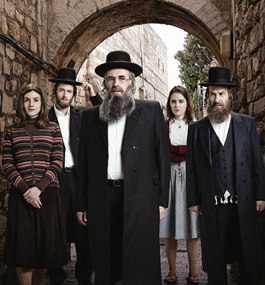Israeli Television Tunes Into the Zeitgeist
Once a viewing desert, Israel sets a new standard for top-notch TV fare.

Ohad Romano / Courtesy Yes Studios
ACCESSIBLE: The Times of Israel says “Shtisel” ushers viewers “into a mysterious and cloistered world.”
by Lawrence Goodman
Three decades ago, Israel was a nation with a single television channel and scant original programming.
These days, if you surf streaming services like Netflix or Hulu, you can’t escape a tidal wave of high-quality Israeli TV shows covering a full spectrum of social and political issues — from war and terrorism, to the daily life of ultra-Orthodox Jews, even to romance between a baker and an international supermodel. Series like “Fauda,” “When Heroes Fly,” “Hostages,” “Shtisel,” “Srugim,” “A Touch Away,” “Prisoners of War” (“Hatufim”) and “Mekimi” are among the biggest hits.
English-language remakes of Israeli shows also abound — “In Treatment” (“BeTipul”); “Homeland” (“Hatufim”); “Traffic Light” (“Ramzor”); and the still-in-development “Zero Motivation,” originally a movie but optioned by actor/director/producer Amy Poehler for the BBC.
“It’s remarkable how quickly Israel has become a player in the international market,” says Shayna Weiss ’07, associate director of the Schusterman Center for Israel Studies, and an expert on Israeli television’s development, and role in society and culture.
Television broadcasting didn’t begin in Israel until 1968, when the government stopped actively trying to keep television out, lest it corrupt the young nation’s socialist bent. “The fear was that it would corrode society,” says Weiss, because “it was bourgeois, capitalist and had no positive societal impact.” Even by the mid-1980s, Israel had only one channel.
Fast-forward to the 1990s. Israel developed multichannel cable and, with it, the demand for more programming. At the same time, post-Zionism began to challenge traditional ideas of “Israeliness.” “Israeli society began to mature,” Weiss says, “fueled by conversations about what society should look like, especially in the wake of the Oslo Accords.” Today, Israeli TV shows often explore war and, even more important, collective trauma. The enemy may remain invisible, but its impact on Israelis isn’t.
“Israeli TV has done a very good job of portraying human drama,” says Weiss. “These are human stories with universal appeal. There’s just enough foreignness in them that they’re exotic, but they’re still familiar.”
For example, “When Heroes Fly” centers on four soldiers who served in the 2006 Lebanon War, sometimes referred to as Israel’s Vietnam. The soldiers go on a mission to Colombia to find a missing friend previously presumed dead. Reliving their Israel Defense Forces experience in Lebanon, they must stick together and trust one another. “They have to process what happened in Lebanon but in Latin America,” says Weiss. “It’s about reprocessing their trauma as a collective experience. That’s very different from America, where we think of trauma on an individual level.”
“Muna,” set to air in the U.S. later this year, features an Israeli-Palestinian photographer who lives in Tel Aviv and struggles with her parents’ more traditional ways. Meanwhile, her liberal Jewish friends don’t understand why she identifies with Palestinians in Gaza since she is a citizen of Israel. “It’s a critique of Israel from multiple directions,” says Weiss.
“Shtisel” breaks new ground with its depiction of an ultra-Orthodox (Haredi) family. “In Zionist ideology, there’s this idea of the old Jew and the new Jew,” says Weiss. “The old Jew is a diaspora Jew, who’s weak, who’s hunched over his books, who represents everything bad about the diaspora.” The “new Jew,” she contends, is the Israeli soldier “who’s going to fix what’s wrong about the diaspora.” But “Shtisel” shows the ultra-Orthodox as part of Israeli society, switching seamlessly between Hebrew and Yiddish, the new and the old.
In “Shtisel,” Haredi Jews “aren’t stock characters or jokes,” says Weiss. “They aren’t extremists. It’s incredibly humanizing.” An American version of the series, set in Brooklyn — titled “Emmis” — is now being developed for Amazon by executive producer Marta Kauffman ’78 and her daughter Hannah K.S. Canter.
Weiss’ personal favorite among popular Israeli shows is “A Touch Away,” a Romeo and Juliet-style drama about a young Haredi woman and her secular Russian neighbor. “It’s a fascinating take on dreams,” Weiss says, “and what happens when our life turns out differently than we planned,” a universally popular theme.
